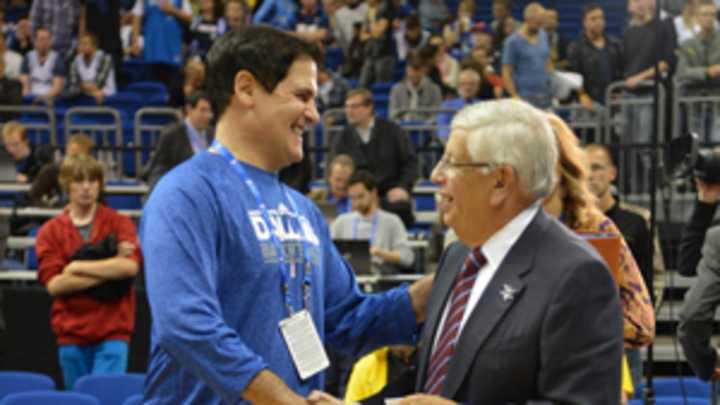Mavericks' Cuban agrees with Stern's fine of Spurs

Mark Cuban understood where David Stern was coming from on his fine for the the Spurs. (Jesse D. Garrabrant/Getty Images)
By Ben Golliver
One of David Stern's most vocal and regular critics came to his defense on Saturday.
Mavericks owner Mark Cuban stood up for the NBA commissioner after Stern fined the Spurs $250,000 for sending four key players home to San Antonio rather than play them during a nationally-televised game against the Heat on Thursday.
Cuban, talking to reporters before a Saturday win over the Pistons in Dallas, said that Stern was justified in leveling the fine, even if he understood Popovich's need to manage his roster, according to the Ft. Worth Star-Telegram.
"Everybody who planned to watch San Antonio vs. Miami on TNT, we've got disappointed customers all over the place," Cuban said before Saturday's Mavericks home game against Detroit. "When I say our biggest customer, TV is our biggest customer. So I'm not saying San Antonio did the wrong thing. I'm just saying I understand exactly why the league did what they did."
"I tried to find every angle not to [side with Stern], but I do know who pays our bills," Cuban said. "That is the driver for all things financial in sports -- period, end of story. And when you [mess] with the money train you get [fined]."
ESPNDallas.com reported further comments.
"Look, I respect the Spurs," said Cuban before the Mavericks beat the Pistons 92-77 on Saturday night. "Pop is the best coach in the league. I understand why he did it. I might even take the fine if it was us, but I understand why the league (fined the Spurs). It maybe should have even been higher, because the amount at stake is enormous."
"We're still a business," said Cuban, whose fine totals from his 13-year ownership tenure are well into seven figures. "Resting the stars for the long haul one game earlier, one game later, sure. Resting when you've got our biggest customer at stake, that's a whole different animal. I'm not saying the Mavs wouldn't have done the same thing, but I realize that it'd be a fineable offense. And if it was me, it'd probably be 10 times as much."
Others in the NBA community have sided with Popovich and the Spurs, including ESPN analyst Jeff Van Gundy and Celtics coach Doc Rivers. Cuban seemed to agree with a point raised by Van Gundy: that scheduling the Spurs on national television for their fourth road game in five nights was detrimental to the television product as well.
In April 2011, Forbes estimated huge growth for the NBA, which has enjoyed record television ratings in recent years, when it comes to the size of their television deals. Those deals currently run through the 2015-16 season.
The NBA’s current deal with ABC, ESPN, TNT and NBA TV, which includes digital rights, pays the league a total of $7.44 billion from the 2008-09 season through the 20015-16 season. The next deal will be for at least an average of $1.2 billion a season, or 30% more.
Cuban's take on the importance of television counts more than most. He founded HDNet, Inc., now AXS TV, and has participated in a number of television programs over the years.
While there's no arguing that the stakes are absolutely enormous, the logic in fining the Spurs for this particular decision doesn't hold up. The stakes were huge last year, when Popovich rested key players during nationally-televised games, and the terms of the television contracts and potential future television contracts were always present over recent years when he's employed this practice. What was bad for TV on Thursday was bad for TV in the past. Stern has known that strategic resting could be a problem for television for years and yet he never enacted clear and straightforward protections against it. He waited, and waited, and waited, doing nothing, and then over-reacted once his lack of action bit him.
It's one of Stern's jobs, as commissioner, along with the league's competition committee, to create the framework to provide the best possible product to the league's television partners. If it's Stern's opinion that strategic resting negatively influences the television product, then it's his responsibility to make sure all thirty teams, and coaches, get that message and clearly understand what is and isn't acceptable. It's impossible, then, to justify fining Popovich out of the blue when there aren't clearly designed rules governing these situations and when both Stern and deputy commissioner Adam Silver have made on-the-record statements in recent years suggesting that strategically resting players is within a coach's purview. Popovich was merely acting under his team's best interests within a system that has been broken -- at least from television's perspective -- for years. By assessing this fine, Stern is scapegoating Popovich and passing the buck.
The buck, and especially the television bucks, should always stop with Stern.

Ben Golliver is a staff writer for SI.com and has covered the NBA for various outlets since 2007. The native Oregonian and Johns Hopkins University graduate currently resides in Los Angeles.